Radiology vendor Visage Imaging inks $19M deal with 1 of Midwest’s largest multispecialty groups
Radiology vendor Visage Imaging has inked a more than $18.6 million (USD) deal with one of the Midwest’s largest independent multispecialty groups.
The seven-year agreement is with Downers Grove, Illinois-based Duly Health and Care, which employs over 1,000 physicians including 40 radiologists working across 150 outpatient locations. As part of the pact, DHC will implement Visage’s enterprise imaging platform as it seeks to unify image exchange across its organization.
The physician group—whose brands include DuPage Medical Group, Quincy MG, and the South Bend Clinic—hopes to go live by June, shedding its legacy PACS and vendor neutral archives.
“Duly Health and Care is an important deal for us as they are in the private radiology/outpatient space, an area of the market where we are starting to see increased opportunity,” Sam Hupert, MBBS, CEO of parent company Pro Medicus, which is based in Australia and acquired Visage Imaging in 2009, said in a statement.
This is the second eight-figure-plus deal for Visage in the past month, after it also signed a $210 million enterprise agreement with Trinity Health. Launched in 2021, Duly Health and Care bills itself as the “largest independent, multispecialty, physician-directed medical group in the nation.”

